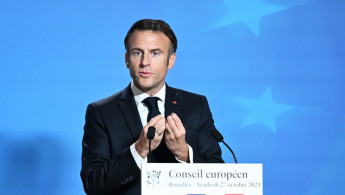Macron calls on Israel to avoid escalation, 'particularly in Lebanon'
French President Emmanuel Macron called on Israel to avoid escalation, "particularly in Lebanon", following a strike in Beirut attributed to Israel that killed Hamas's deputy leader, the Elysee Palace said Tuesday.
Macron, who spoke by telephone with Israeli minister and war cabinet member Benny Gantz, said "it was essential to avoid any escalatory attitude, particularly in Lebanon, and that France would continue to pass on these messages to all players directly or indirectly involved in the area", the presidency said.
Hamas number two Saleh al-Aruri was killed in a strike attributed to Israel in a suburb of Beirut on Tuesday evening, the Palestinian armed group and Lebanese security officials said.
Israel regularly carries out strikes against the Hezbollah movement along its shared border with Lebanon, but Aruri's killing was the first time since the start of the war in Gaza that it has targeted the Lebanese capital.
After the strike, Hezbollah vowed Aruri's death would not go "unpunished", calling it "a serious assault on Lebanon... and a dangerous development in the course of the war".
Lebanese Prime Minister Najib Mikati also condemned the killing and said it "aims to draw Lebanon" further into the Israeli war.
In his conversation with Gantz, Macron reiterated his call for a "lasting ceasefire" between Israel and Hamas, the presidency said.
He also expressed again his "deepest concern" at the mounting civilian death toll in Gaza, as well as the humanitarian crisis unfolding inside the Palestinian territory, while at the same time reaffirming "France's commitment to the security of Israel".
Israel's relentless bombardment and ground offensive against Gaza has killed at least 22,185 people, mostly women and children, according to Gaza's health ministry.





 Follow the Middle East's top stories in English at The New Arab on Google News
Follow the Middle East's top stories in English at The New Arab on Google News


